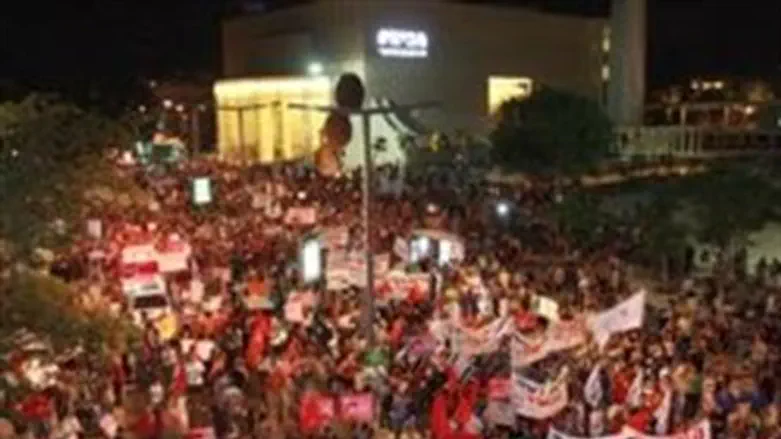
Tens of thousands of demonstrators gathered in varied locations across Israel from Kiryat Shmona in the north to Beersheba in the south to protest the cost of living in Israel. Some estimates went as high as 150,000 with 75,000 of them in Tel Aviv where they were reportedly blocking the main Ibn Gevirol road at midnight.
Opposition leader Tzipi Livni demanded Prime Minister Binyamin Netanyahu meet with her and called on Knesset Speaker Rueven Rivlin to cancel the Knesset's summer recess to address what has been dubbed Israel's 'Housing Crisis' by Israel's media, and is now characterized by left wing politicians jumping on the bandwagon to try to cause damage to Netanyahu's standing in the polls.
Livni's statement called on Rivlin to "forbid a holiday next week. I call on Netanyahu to agree to our reading in the plenum. The Knesset needs to continue working and fix what is happening in the streets."
"This is no time for the Knesset for a holiday. If Netanyahu is going to change the situation the Knesset must keep working and face a test - whether to take action or make more speeches," she challenged.
Livni's call is not original or ground-breaking. Interior Minister Eli Yishai (Shas) last week called on Rivlin to cancel the Knesset's scheduled holiday to address public concerns related to the cost of living in Israel.
Foreign Minister Avigdor Lieberman called on the public to put Israel's economic troubles "in perspective" last week.
On a Friday prime time show on Israeli radio, a protestor was interviewed about the article he had written on the protests for the Hebrew language Maariv. He explained in all seriousness that he and his friends could not possibly move to Lod, a low rental city only a half hour's train ride from Tel Aviv, because they would have to buy cars to be able to get to Tel Aviv's night life on Friday nights due to the lack of public transportation on the Sabbath.
“Look at the crises the European Union is facing,” Lieberman said.
“There is now a second plan being implemented to rescue Greece. Look at the economic hardships in the US. Here, thank God, we have growth.
"In terms of macroeconomics, we’re still okay. In Europe, they’re saying our troubles are troubles of the rich. Let’s put things back into perspective,” he added.
Netanyahu is expected to appoint a team to examine ways to reduce what he has termed Israel's "indirect tax burden" in the coming days. Housing and rental prices have rocketed in Israel in recent years. Improved public transportation would make it easier to live out of the main cities, which are expensive to live in as in most main Western cities.
According to MK Ophir Akunis, a close associate of Netanyahu, "The government is attentive to public sentiment and is working to ease the burden."